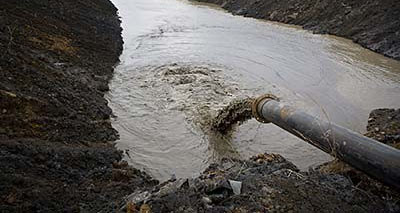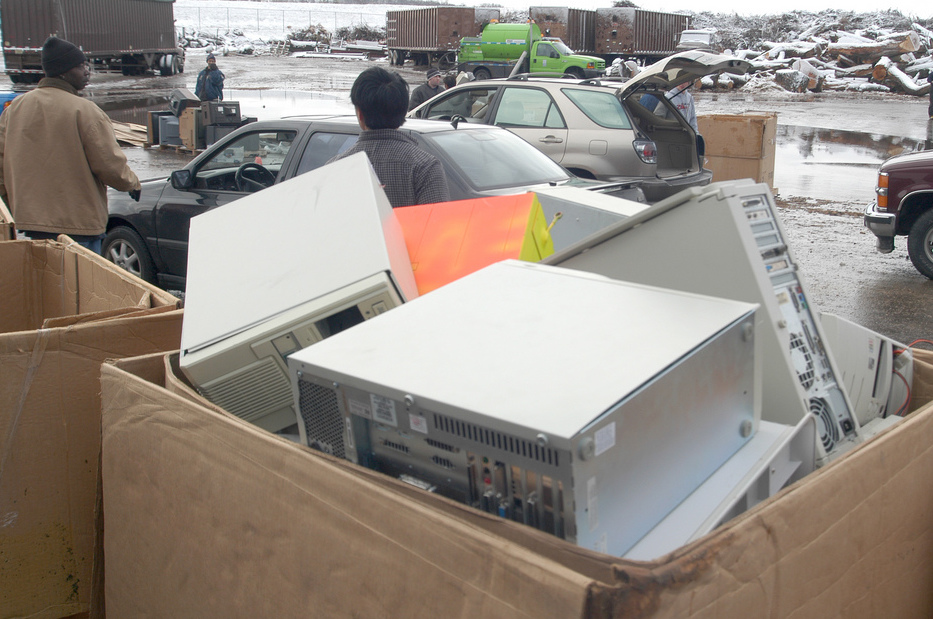The bill’s chief sponsor is Representative
Chuck McGrady of Henderson County.
The GOP-controlled House passed SB 71 on Wednesday, May 25 by a vote of 86 to 25 and sent it to the Senate, after speeding the bill through several committees. The Senate could take up the bill as soon as next week. Senate leaders, including Hendersonville Republican Sen. Tom Apodaca, appear to support the legislation but want to fix a largely technical issue with some of the bill’s language.
You can read the current text of SB71 (version 3) here.
Here’s a summary of the major parts of the bill and MountainTrue’s take on each part:
1. Clean Drinking Water. The bill requires Duke Energy to provide a permanent source of clean drinking water to homes where wells are already or will potentially be contaminated by coal ash. Residents whose drinking water is threatened by coal ash contamination will be connected to public water supply, or, where doing so cost is prohibitive, Duke will be required to provide and maintain water filtration systems.
MountainTrue’s Take:
We support the legislature’s efforts to provide a safe, permanent drinking water supply to all residents who are or will be affected by coal ash. (It’s this section of the bill, by the way, that needs fixing in the Senate. An amendment approved during the House debate of the bill inadvertently disqualifies some people from receiving requirement of clean drinking water. Clearly, this mistake must be corrected.) While we support piping in clean water to these residents, requiring Duke Energy to do so does not take the company off the hook for thoroughly cleaning up North Carolina’s coal ash pits; nor should it be used to justify downgrading the risk classification for any coal ash pond.
2. Beneficial Use of Coal Ash. SB 71 requires that Duke Energy find safe, beneficial reuse of 2.5 million tons of coal ash annually, with at least 50 percent coming from existing coal ash pits.
MountainTrue’s Take:
We support a legal requirement that Duke Energy find a safe reuse of coal ash to reduce the amount that must be excavated and stored away from our rivers and drinking water sources. SB 71 specifically and correctly dictates that this coal ash be used to make concrete – a relatively safe application – instead of other less safe products, such as agricultural fertilizer or landscaping infill.
3. Reviving the Coal Ash Commission. The overriding goal of SB 71 is to reconstitute the Coal Ash Management Commission, which was disbanded when the state Supreme Court agreed with Governor McCrory that the commission created under the 2014 legislation violated the state constitution’s separation of powers requirement. In response to the court decision, SB 71 gives the executive branch more oversight of the Coal Ash Management Commission. Under the new bill, the governor would appoint five of the commission’s seven appointees, who would be subject to confirmation by the General Assembly. The previous commission included three members appointed by the Senate, three by the House, and three by the Governor.
MountainTrue’s Take:
MountainTrue supports oversight and review of the Department of Environmental Quality’s (DEQ) coal ash cleanup efforts, which have not inspired confidence in the agency’s leadership. The problem is that under SB 71, reconstituting the commission would also provide an opportunity to change DEQ’s recently announced classifications for most coal ash pits in the state. These classifications dictate the level of clean up at each coal ash pit, including whether a pit must be emptied and the coal ash moved offsite or simply capped in place. Many in the legislature believe these classifications are a political stunt by the McCrory administration to appear tough on Duke Energy – and that Duke will find a way around them. Others believe Duke’s claims that the DEQ classifications will require clean-up efforts that are unnecessarily and prohibitively expensive – and will drive up utility costs for consumers and businesses. We believe these concerns are exaggerated and that, if they prove to be accurate, they can be addressed more narrowly, without revising all of the DEQ classifications.
4. Extended Comment Period. SB 71 reopens the public comment period for the proposed risk classifications for the state’s coal ash ponds until August 1, 2016. Under the proposed bill, DEQ will have until September 1, 2016 to submit new proposed classifications for review by the Coal Ash Management Commission, which is reformed under the legislation. The Commission will have up to 240 days to make a final classification.
MountainTrue’s Take:
We strongly oppose unnecessary delays to the approval of the risk classifications for the state’s coal ash ponds. Under SB 71, final decisions about classifications might not occur until March 2017. That is an unacceptable delay. Duke Energy and the state have been collecting data on coal ash lagoons for years. Earlier this month, DEQ issued its recommended classifications, as required by the 2014 Coal Ash Management Act. The Governor, DEQ and the legislature should accept these classifications. If there is concern about Duke’s ability to meet statutory deadlines for excavation, those concerns can and should be addressed without revising the 2014 legislation altogether.
Bottom Line:
We understand and agree with the motivations of Representative McGrady and other legislators who support this bill, and their desire to help the people of North Carolina who are most directly impacted by coal ash pollution. However, we believe that risks of SB 71 outweigh its benefits. We are concerned that in the process of revising the state’s coal ash laws, the legislature may provide an avenue for the reclassification of many of Duke Energy’s coal ash pits and substantially decrease the quality of their clean up, including the number that are required to be excavated rather than simply capped in place. If there is concern about Duke’s ability to meet statutory deadlines for excavation or other requirements of the Act, those concerns can and should be addressed without running the risk of revising the entire classification process for most of Duke Energy’s coal ash pits.
Making Your Voice Heard
The legislature’s review of SB 71 is ongoing but moving quite quickly. North Carolinians who want to have their voices heard on this important legislation should act now.
We encourage you to contact your legislators and ask them to reject any changes to the state’s coal ash laws that would allow the current classification recommendations submitted by the DEQ to be revised.
> Click here to take action.
If you have questions about this issue or MountainTrue’s coal ash work, please contact Joan Walker, Campaigns Director at joan@mountaintrue.org or 828.258.8737 x205.





